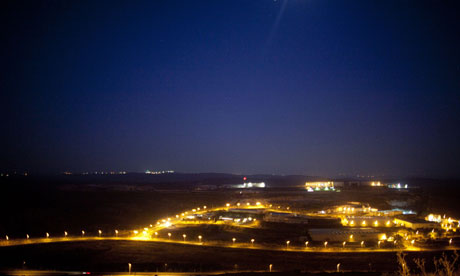Israel passes law banning citizens from calling for boycotts
Law for Prevention of Damage to State of Israel through Boycott means anyone proposing boycott could be sued

The Israeli parliament tonight passed a law in effect banning citizens from calling for academic, consumer or cultural boycotts of Israel in a move denounced by its opponents as anti-democratic.
Israel passes law banning citizens from calling for boycotts
Law for Prevention of Damage to State of Israel through Boycott means anyone proposing boycott could be sued

The Israeli parliament tonight passed a law in effect banning citizens from calling for academic, consumer or cultural boycotts of Israel in a move denounced by its opponents as anti-democratic.
The "Law for Prevention of Damage to the State of Israel through Boycott" won a majority of 47 to 38, despite strong opposition and an attempt to filibuster the six-hour debate. Prime minister Binyamin Netanyahu did not take part in the vote although the bill had the backing of the cabinet.
Under the terms of the new law, an individual or organisation proposing a boycott may be sued for compensation by any individual or institution claiming that it could be damaged by such a call. Evidence of actual damage will not be required.
The law aims to protect individuals and institutions in Israel and the Palestinian territory it has occupied, illegally under international law, since 1967.
It in effect bans consumer boycotts of goods produced in West Bank settlements, or of cultural or academic institutions in settlements. It also prevents the government doing business with companies that comply with boycotts.
Israeli civil rights groups immediately issued a letter of protest over the law.
Hassan Jabareen of Adalah, a legal centre for Israeli-Arab citizens, said: "Defining boycott as a civil wrong suggests that all Israelis have a legal responsibility to promote the economic advancement of the settlements in the occupied Palestinian territories. This means that Israeli organisations opposing the settlements as a matter of principle are in a trap: any settler can now constantly harass them, challenging them to publicly declare their position on the boycott of settlements and threatening them with heavy compensation costs if they support it."
As debate on the bill opened in the Knesset, the Israeli parliament’s legal adviser presented an opinion that parts of the proposed law were "borderline illegal".
"The broad definition of a boycott on the state of Israel is a violation of the core tenet of freedom of political expression and elements in the proposed bill are borderline illegal," Eyal Yinon said.
Among the bill’s opponents were dozens of Israeli intellectuals, including the celebrated author Amos Oz, who issued a letter describing the proposed law as the "worst of the anti-democratic bills in the Knesset. The bill will turn law-abiding citizens into criminals".
According to the Association of Civil Rights in Israel, the bill constituted "a direct violation of freedom of expression". Following the vote, executive director Hagai El-Ad said: "The boycott law will lead to unprecedented harm to freedom of expression in Israel and will bring justified criticism against Israel from abroad. We will all have to pay the price for this atrocious law."
Saeb Erekat, the Palestinian chief negotiator, said the bill would punish those who "refuse to recognise the illegal situation associated with Israel’s settlement enterprise in occupied Palestinian territory".
The bill’s sponsor, Ze’ev Elkin of the rightwing Likud party, said Israel had been dealing for years with boycotts by Arab states but the domestic boycott movement was a "travesty". The law was not intended to silence people but to "protect the citizens of Israel", he said.
"If the state of Israel does not protect itself, we will have no moral right to ask our allies for protection from such boycotts."
Before the vote, Elkin told the pro-settlement news website Arutz Sheva: "I hope the [legislators] will understand that this is a battle between Zionism and the new left."
The law follows moves to boycott a cultural centre and a university in the huge West Bank settlement of Ariel, and the contractual agreement of some Israeli companies not to use material originating in settlements in work on the new Palestinian city of Rawabi.
Campaigners also claim that consumer boycotts against produce and goods originating in settlements are growing both in Israel and abroad.
There has been a raft of proposals over recent years denounced by opponents as anti-democratic, including the withdrawal of financing for Israeli films deemed to be critical of government policies and attempts to restrict the international funding of campaigning groups.
The Israeli left and rights groups claim the proposals represent a growing intolerance of dissent in Israel, encouraged by rightwing parties which claim political activity against government policy is part of a campaign of "de-legitimisation" of the Jewish state.
Civil rights groups said they would challenge the new law in the courts, putting a spotlight on Israel’s 44-year occupation. A national campaign was due to be launched by activists .





